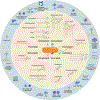Gut microbiome lipid metabolism and its impact on host physiology
- PMID: 36758518
- PMCID: PMC10124142
- DOI: 10.1016/j.chom.2023.01.009
Gut microbiome lipid metabolism and its impact on host physiology
Abstract
Metabolites produced by commensal gut microbes impact host health through their recognition by the immune system and their influence on numerous metabolic pathways. Notably, the gut microbiota can both transform and synthesize lipids as well as break down dietary lipids to generate secondary metabolites with host modulatory properties. Although lipids have largely been consigned to structural roles, particularly in cell membranes, recent research has led to an increased appreciation of their signaling activities, with potential impacts on host health and physiology. This review focuses on studies that highlight the functions of bioactive lipids in mammalian physiology, with a special emphasis on immunity and metabolism.
Keywords: PUFAs; autoimmune disease; bacteria; cholesterol; diet; inflammation; innate immunity; lipids; metabolism; microbiome; phospholipids; sphingolipids.
Copyright © 2023 Elsevier Inc. All rights reserved.
Conflict of interest statement
Declaration of Interests R.J.X. is a member of the Scientific Advisory Board at Nestlé, founder of Jnana and Celsius Therapeutics, and board member of MoonLake Therapeutics.
Figures



References
Publication types
MeSH terms
Substances
Grants and funding
LinkOut - more resources
Full Text Sources

